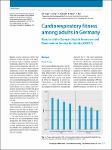Cardiorespiratory fitness among adults in Germany
Results of the German Health Interview and Examination Survey for Adults (DEGS1)
Finger, Jonas
Krug, Susanne
Gößwald, Antje
Härtel, Sascha
Bös, Klaus
A high level of fitness is an indicator for a good health state. Therefore, cardiorespiratory fitness was examined in the cross-sectional German Health Interview Survey for Adults (DEGS1). Data from 3,030 test-qualified adults between 18 and 64 years old were assessed by means of a standardized submaximal cycle ergometer test. Test-qualified participants were significantly younger, more often men, less often obese and showed a better health state than those who were not test-qualified. The calculated physical work capacity at 75% of the age-predicted maximum heart rate (PWC75%) in watts per kg bodyweight was among men 1.52 and among women 1.15. PWC75% declines by 4.2% per age decade for men and 4.8% for women. A higher socioeconomic status (SES) is associated with better fitness among women. No significant association was observed between SES and fitness among men. These findings can be used to develop target-group specific health-promotion interventions in order to enhance cardiorespiratory fitness. It is planned to calculate updated PWC reference values based on the DEGS1 data.
Files in this item
No license information

